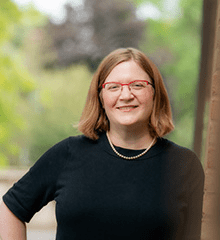In the spring semester of 2020 I taught an elective course, developed through support from the Stewardship Leaders Program, entitled “Work, Money, and the Old Testament.” The course began with the premise that in order to engage stewardship effectively, Christian faith communities must grapple with the Old Testament. After all, the foundational concepts of stewardship in the church—including tithing, vocation (or call), and even the notion of “stewardship” itself—have their roots in Old Testament texts. Sometimes, though, those classic stewardship vocabulary words sidestep frank conversation around some of the most fundamental and difficult concepts with which Old Testament texts are concerned, namely, work and money. In this course we revisited some of those biblical basics in light of current cultural and economic expectations around work.
Like virtually everything in the spring 2020, plans for the semester were interrupted and significantly reconfigured with the onset of the COVID-19 pandemic. Yet we soon discovered that the whole world was reconsidering together the value of work. Health care workers were suddenly recharacterized as soldiers, heroes on the “front lines” of the fight against COVID-19. Grocery store workers began considering whether their wages matched the risk they were taking on, and some even began receiving hazard pay. We supplemented our course readings with emerging news stories, such as this one from Minnesota Public Radio, which describes a college student whose grocery job suddenly went from a mundane source of income to a position with purpose. And, of course, we watched as millions upon millions of people lost their jobs altogether. It seemed as though we were witnessing the gap between the rich and the poor growing in real time.
So what, then, did watching the pandemic unfold through the eyes of Old Testament study teach us about stewardship? I will offer here three brief observations drawn from the work of the course. They are neither conclusions nor solutions to any of the myriad difficulties facing the church and its relationship with money and work; rather, starting points for conversations about the Bible and work in your own contexts.
The Bible calls us to reject any impulse we have to be like Pharaoh
At the heart of the account of the origins of ancient Israel in the Old Testament is the experience of the Hebrews’ liberation from enslavement in Egypt. The memory of forced labor, as well as God’s commitment to deliverance from it, shadows the ordering of life in covenant community. I brought you out of Egypt, intones God in the Torah over and over. Remember you were a slave, and the LORD God redeemed you, repeats the book of Deuteronomy. That memory infuses the Law with regulations designed to prevent the Israelites from slipping into enslavement again, but perhaps even more importantly, to prevent the Israelites from becoming like Pharaoh, who exploited the labor of the Hebrews out of his own greed mingled with fear. Under Pharaoh there was no rest, only the terror and tyranny of endless work.
Faith communities need to think together about sabbath
Week after week, class discussions around sabbath had remarkable energy. Students lamented cultural narratives that glorify busyness and workaholism over regenerative rest, and they were also drawn to Walter Brueggemann’s emphasis on refraining from participation in the economic cycles of production as an act of sabbath-keeping. They noted that sabbath can be a function of privilege, with the economic pressures of low-wage work requiring more hours of work for minimum compensation. They also spent significant time pondering the difficulty pastors and other church leaders encounter in setting sabbath-keeping boundaries for themselves. Many students were surprised that the sudden and wide-reaching cancellations in the earliest days of the pandemic brought on a kind of “forced” sabbath that they had not realized they needed. Our sabbath discussions revealed a hunger for thinking together about how Christians order time so that their bodies and their relationships can flourish.
Stewardship is more than giving
Stewardship is not just about donating to the church, whether that giving happens in dollars or in time and talents. Stewardship is about pursuing ecological justice—care for God’s creation. Stewardship is about pursuing economic justice—living wages and fair labor practices. The witness of the Old Testament, from its creation narratives to its exodus testimony to its prophetic calls on behalf of the poor, refuses to compartmentalize work, money, vocation, or giving apart from the rest of our lives. We have to think about how our spending practices, investment strategies, and legislative policies perpetuate the suffering of our neighbors, and then work to change those choices that cause harm. To grapple with Old Testament stewardship means to speak frankly about value as both a quantitative and qualitative concept, recognizing that what the world values and what God values are rarely aligned.
Your faith community is probably reimagining many aspects of its ministries during the pandemic. As you wrestle with how to be effective and faithful in challenging times, I invite you to re-engage biblical ideas of work, money, and stewardship. Congregations can find in this moment an opportunity to reflect on the values and practices that order their own lives and the lives of the faith community, as well as look with hope for a new way forward in a changed world.



